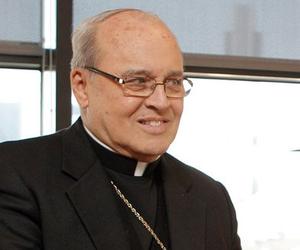Cardinal praises prominent Cuban dissident at funeral
- Submitted by: lena campos
- Society
- 07 / 26 / 2012

Cuban Cardinal Jaime Ortega paid tribute to the "clear political vocation" and religious faith of leading dissident Oswaldo Paya at his crowded funeral on Tuesday, days after the prominent anti-communist activist died in a car crash.
Family members have questioned the circumstances of Sunday's crash on a badly potholed road in eastern Cuba, alleging possible foul play by government agents. But diplomats say they believe it was a genuine accident and it appeared the car was speeding.
Paya, the 60-year-old leader of the Christian Liberation Movement, and fellow dissident Harold Cepero, died after the rental car they were traveling in, accompanied by two European politicians, hit a tree in eastern Granma province, according to the government. The cause of the crash is officially under investigation.
"Oswaldo had a clear political vocation, and this, like a good Christian, did not take him from his faith and religious duties," Ortega told the packed memorial Mass at a church in the Havana suburb of Cerro, where the civil rights activist lived.
"Quite the contrary, he always looked to his faith for inspiration in his political activity," Ortega said.
Ortega announced that Pope Benedict XVI had sent a message of condolence to the family.
A devout Catholic who was sent to a labor camp in the 1960s for his religious beliefs, Paya overcame intimidation and harassment to build Cuba's first nationwide opposition initiative, the Varela Project, which gathered 25,000 signatures for a referendum on one-party rule.
The petition drive was rejected by the government in 2002, but Paya emerged as the leading advocate of peaceful democratic change in Cuba.
As hundreds of activists, diplomats and friends quietly left the church to accompany Paya's family to Havana's Colon cemetery, dozens of dissidents chanting "?freedom, freedom," were herded onto a bus by police and driven away, the only incident reported.
It was not immediately clear what happened to the detainees, though usually they are quickly released without charges.
SPANIARD HELD IN CRASH
Swedish politician Aron Modig, chairman of the Christian Democrats' youth wing, and Spaniard Angel Carromero Barrios, vice president of the ruling Popular Party's "?New Generations" movement, who were traveling with Paya, suffered minor injuries and were released from hospital on Monday.
The two men were not immediately available for comment.
Members of Paya's immediate family have charged the car was repeatedly rammed and then forced off the road by another vehicle.
"We have serious doubts that it was an accident," Rosa Maria Paya, one of the activist's three daughters, told Reuters. "?But we do not know for sure what happened," she added.
European diplomats said that while Modig had returned to Havana and was free to fly home, Carromero, who was driving the vehicle, remained in Granma as of Monday night, and faced possible charges for reckless driving and involuntary manslaughter.
The diplomats, who asked not to be identified, said it appeared the vehicle, traveling at well above the speed limit, hit a large pot hole, veered off the road and hit a tree.
The diplomats said that so far there was no evidence to back up the allegations by Paya's daughter.
The diplomats said the Cuban government had met with both country's ambassadors and expressed a desire to work out the incident.
ADVOCATE OF RECONCILIATION AND DIALOGUE
Paya was a unique voice in Cuba's dissident movement and his death leaves "a very large gap," said Philip Peters, a Cuba expert with the Lexington Institute, a conservative policy research group in Virginia.
"Unlike others in the dissident movement he engaged in retail politics. His Varela Project enlisted citizen participation and connected with many thousands of Cubans. That's what set him apart."
Paya was also controversial in the dissident movement because he supported dialogue and reconciliation with the Cuban government, while opposing the U.S. economic embargo against Cuba.
A soft-spoken, unassuming medical equipment engineer, Paya was awarded the European Union's top human rights award in 2002, the Sakharov Prize, named after the late Soviet dissident Andrei Sakharov. He was also nominated twice for the Nobel Peace Prize by former Czech President Vaclav Havel.
Cuba's numerous dissident groups are often at odds with each other and in many cases have been critical of Cardinal Ortega's ongoing dialogue with President Raul Castro after he replaced his ailing brother Fidel in 2008 and initiated a series of economic and social reforms.
But those differences were put aside on Tuesday to pay homage to a man all praised for his ethics and courage.
Castro, Ortega and the Council of Bishops began the dialogue two years ago that led to the release of 130 political prisoners, more space for the church to carry out its mission and Pope Benedict XVI's visit to the island in March.
Paya applauded those successes, but he was highly critical of the church's support of Castro's efforts to reform the communist system. He repeatedly charged his movement, and other grass-roots activists with similar views, were being marginalized by Cuba's bishops.
He was especially critical of the pope's decision not to meet with dissidents during his March visit.
He also had a strong following among Cuban exiles in the United States and elsewhere. In 2003, he visited the United States, where he was received by then-Secretary of State Colin Powell, before spending several days in Miami meeting with Cuban exiles.
Various governments and personalities sent their condolences to Paya's family and the internal opposition in Cuba for the loss, including the White House.
"The president's thoughts and prayers are with the family and friends of Oswaldo Paya, a tireless champion for greater civic and human rights in Cuba," the White House said in a statement.
Source: Reuters.com
Comments